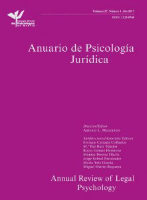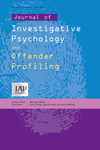
Journal of Criminal Psychology
Scope & Guideline
Pioneering interdisciplinary research at the intersection of psychology and law.
Introduction
Aims and Scopes
- Criminal Behavior Analysis:
The journal extensively covers topics related to the psychological underpinnings of criminal behavior, including investigations into personality traits such as psychopathy, the role of trauma, and cognitive processing in offenders. - Victimology and Trauma:
Research addressing the experiences and psychological impacts on victims of crime, particularly focusing on sexual violence, domestic abuse, and the consequences of victimization. - Forensic Psychology Applications:
The journal highlights the application of psychological assessment and intervention in forensic contexts, including evaluations of offenders, risk assessments, and the role of mental health in criminal justice. - Policing and Legal Decision-Making:
Exploration of the psychological aspects influencing policing practices, juror decision-making, and the efficacy of legal processes, with an emphasis on improving outcomes for victims and offenders alike. - Emerging Crime Trends and Interventions:
A focus on contemporary issues in crime, such as cybercrime, extremism, and innovative intervention strategies in community and forensic settings.
Trending and Emerging
- Intersection of Mental Health and Crime:
A rising trend in exploring how mental health issues intersect with criminal behavior, including the effects of trauma, psychopathology, and the role of psychological assessments in legal contexts. - Impact of Technology on Crime:
An emerging focus on how technological advancements, such as digital behavior analysis and cybercrime, affect criminal practices and law enforcement strategies. - Gender and Crime Dynamics:
Research examining the nuances of gender in criminal behavior, victimization, and the judicial process, highlighting the experiences of female offenders and male victims. - Community-Based Interventions:
An increasing number of studies are dedicated to evaluating community and school-based approaches to crime prevention, indicating a shift towards practical applications of psychological research. - Cultural and Societal Influences on Crime:
Recent publications are increasingly examining how cultural context and societal factors contribute to criminal behavior and victimization, suggesting a broader understanding of crime within diverse populations.
Declining or Waning
- Traditional Theories of Crime:
There is a noticeable reduction in papers that rely heavily on classical criminological theories without integrating psychological perspectives, suggesting a shift towards more interdisciplinary approaches. - Generalized Studies of Violence:
Research that broadly examines violence without specific context or psychological insight has become less frequent, indicating a trend towards more nuanced and context-specific studies. - Overreliance on Quantitative Methods:
The journal seems to be moving away from purely quantitative studies, as there is a growing emphasis on qualitative research methods that provide deeper insights into the lived experiences of offenders and victims.
Similar Journals

JOURNAL OF FORENSIC PSYCHIATRY & PSYCHOLOGY
Exploring the Nexus of Psychology and LawJOURNAL OF FORENSIC PSYCHIATRY & PSYCHOLOGY, published by Routledge Journals, Taylor & Francis Ltd, is a pivotal platform for advancing knowledge at the intersection of psychology, psychiatry, and the legal system. With an ISSN of 1478-9949, this esteemed journal has been providing a critical forum since its inception in 2003, continuing through to 2024, to foster interdisciplinary dialogue among researchers, clinicians, and legal professionals. The journal holds a Q3 category ranking in both Clinical Psychology and Psychiatry and Mental Health, reflecting its important contributions to the field. With a focus on empirical research, theoretical perspectives, and case studies, it aims to enhance the understanding of forensic issues while ensuring ethical considerations in psychological assessments and interventions. Although it currently does not provide open access, the journal's rigorous peer-review process assures high-quality publications. Researchers looking to stay at the forefront of forensic psychology will find this publication indispensable for their scholarly work and practical applications.

Journal of Penal Law and Criminology-Ceza Hukuku ve Kriminoloji Dergisi
Fostering Dialogue in Law and CriminologyThe Journal of Penal Law and Criminology-Ceza Hukuku ve Kriminoloji Dergisi, published by ISTANBUL UNIV, is a prestigious platform dedicated to the advancement of knowledge in the fields of criminal law and criminology. With its Open Access policy adopted since 2017, it aims to promote the dissemination of research findings and theoretical discussions, ensuring that vital insights in criminal justice, legal reforms, and criminological studies are accessible to a global audience. This journal serves as a vital resource for academics, legal practitioners, and students alike, fostering interdisciplinary dialogue and encouraging innovative research. By focusing on contemporary issues in penal law and criminology, the journal enhances understanding and addresses the complexities of justice in a rapidly changing society. With an ISSN of 2148-6646 and an E-ISSN of 2602-3911, it continuously strives to maintain high scholarly standards and relevance in its contributions to the field.

Journal of Police and Criminal Psychology
Unraveling the Complexities of Crime through Psychological ResearchThe Journal of Police and Criminal Psychology, published by Springer, is a leading scholarly periodical that explores the intricate intersections of psychological principles and law enforcement practices. Founded in 1985, this esteemed journal serves as an essential resource for researchers, practitioners, and students alike, addressing contemporary issues in applied psychology and law, and has achieved a commendable position in its field, with a 2023 Scopus ranking of #128 in Law and #123 in Applied Psychology. With an impressive impact factor, it reflects the journal's commitment to advancing knowledge and fostering dialogues surrounding criminal behavior, law enforcement strategies, and psychological assessments. The journal maintains a non-open access model, ensuring rigorous peer-review standards while reaching a global audience interested in the psychological dimensions of criminal justice. As it continues to converge into 2024, the Journal of Police and Criminal Psychology remains dedicated to fostering groundbreaking research and facilitating critical insights that inform policy and practice in police psychology.

CANADIAN JOURNAL OF CRIMINOLOGY AND CRIMINAL JUSTICE
Transforming Understanding of Justice SystemsCanadian Journal of Criminology and Criminal Justice is a premier peer-reviewed journal published by University of Toronto Press Inc., focusing on the vibrant fields of criminology and criminal justice. With an ISSN of 1707-7753 and an E-ISSN of 1911-0219, this journal serves as a key platform for interdisciplinary scholarship that aims to advance understanding and improve practices within the field. As a testament to its impact, it is classified in the Q2 quartile for both Law and Social Sciences (miscellaneous) categories as of 2023, reflecting its esteemed position within academic research, ranked #371 out of 1025 in Social Sciences - Law and #290 out of 604 in Social Sciences - Miscellaneous. Spanning from 2003 to 2024, this journal's content encompasses a wide array of topics and contributes to crucial dialogues concerning crime, justice policies, and societal implications. Though it is not an open access journal, researchers, professionals, and students will find a wealth of knowledge that is instrumental for developing impactful criminological studies and informing policy-making in the Canadian context and beyond. Based in Canada at Journals Division, 5201 Dufferin St, Downsview, Toronto, ON M3H 5T8, it stands as an essential resource for those engaged in criminology and criminal justice research.

Anuario De Psicologia Juridica
Unlocking Knowledge in Psychology and Legal Practice.Anuario De Psicologia Juridica is a prestigious academic journal published by the COLEGIO OFICIAL PSICOLOGOS MADRID, specializing in the intersection of psychology and law. Since becoming an Open Access publication in 2013, the journal has made significant strides in expanding access to high-quality research, thereby fostering knowledge dissemination and engagement in the fields of Applied Psychology, Law, and Forensic Medicine. With a notable impact factor and categorized as Q3 in Applied Psychology, Q1 in Law, and Q2 in Pathology and Forensic Medicine, it stands out for its contributions to the evolving nature of forensic psychology and legal assessment. As of 2023, the journal is ranked in the 90th percentile among law journals and in the 58th percentile among pathology and forensic medicine, underscoring its relevance and authority. Researchers, professionals, and students will find Anuario De Psicologia Juridica to be an invaluable resource for cutting-edge research and practical applications that aim to bridge psychological theories with legal practices.

Criminal Law and Philosophy
Innovative Perspectives on Law and Moral TheoryCriminal Law and Philosophy, published by SPRINGER in the Netherlands, is an esteemed peer-reviewed journal that explores the intricate intersections of law and philosophical inquiry. With an ISSN of 1871-9791 and an E-ISSN of 1871-9805, this journal is a vital resource for researchers, professionals, and students interested in the ethical, theoretical, and practical dimensions of criminal law. Renowned for its rigorous contributions and innovative perspectives, the journal has achieved a commendable Q2 ranking in both the fields of Law and Philosophy as of 2023, and demonstrates a strong commitment to fostering critical dialogue in these disciplines. With a Scopus rank placing it in the top 25% of Philosophy journals and above the 56th percentile in Law, Criminal Law and Philosophy continues to expand its influence and accessibility within the academic community and beyond, making it an indispensable platform for advancing scholarship at the confluence of law and moral theory.

Trends and Issues in Crime and Criminal Justice
Innovating solutions for a safer society.Trends and Issues in Crime and Criminal Justice is a leading journal in the field of criminology, published by the Australian Institute of Criminology. This esteemed journal, recognized with an H-index that reflects its influence and contribution to the social sciences, particularly law, spans from 2011 to 2024 and is ranked in the Q1 category within its discipline according to the 2023 data. With a Scopus ranking of #123 out of 1025 in the Social Sciences - Law category, placing it in the 88th percentile, it serves as a critical resource for researchers, practitioners, and students alike.
Focused on innovative research and emerging issues within crime and criminal justice, the journal seeks to foster scholarly collaboration and discourse, making it an essential hub for new ideas and evidence-based practices in the field. The journal’s commitment to advancing knowledge and influencing policy ensures that it remains an influential voice in criminological studies, aiming to address pressing issues facing societies globally.

Women & Criminal Justice
Empowering Voices, Transforming JusticeWomen & Criminal Justice, published by Routledge Journals, Taylor & Francis Ltd, stands as a prominent platform for scholarly discourse in the intertwined realms of gender studies and legal research. Since its inception in 1989, this journal has been pivotal in addressing the unique challenges and perspectives of women within the criminal justice system, making substantial contributions to the field. With a commendable impact factor reflected in its Q1 ranking in Law and Q2 ranking in Gender Studies, it offers both researchers and practitioners rigorous and insightful analyses. The journal covers a wide spectrum of topics, aligning contemporary issues with legal frameworks, while advocating for a nuanced understanding of gender-related injustices. Though it operates under a traditional access model, its invaluable insights foster essential discussions among academics, policymakers, and social advocates. By engaging with themes of societal crime, victimization, and justice reform, Women & Criminal Justice continues to underscore the importance of integrating gender awareness into legal scholarship and practice, thereby enriching the broader academic community.

Journal of Investigative Psychology and Offender Profiling
Advancing Understanding of Criminal Behavior.Journal of Investigative Psychology and Offender Profiling, published by WILEY in the United Kingdom, is a leading resource dedicated to the exploration of psychological theories and methodologies as they relate to criminal behavior and offender profiling. With an ISSN of 1544-4759 and an E-ISSN of 1544-4767, this journal serves as a critical platform for researchers, professionals, and students engaged in the fields of Applied Psychology and Social Psychology. The journal's impact is underscored by its recent ranking in the Q3 quartile for Applied Psychology and Q4 for Social Psychology, as well as its significant positions within Scopus rankings. Operating without an open access model, it maintains a strong commitment to the dissemination of scholarly work from 2009 to 2024, encompassing novel investigations that deepen our understanding of psychological dimensions associated with crime. By fostering a multidisciplinary dialogue, the journal not only enhances academic inquiry but also contributes to practical advancements in criminology and offender rehabilitation.

Revista Criminalidad
Exploring the Intersection of Crime and SocietyRevista Criminalidad, published by POLICIA NAC COLOMBIA, is a distinguished academic journal that has been open access since 1958, making critical research in the field of criminology readily available to the global scholarly community. Based in Colombia, this journal serves as a prominent platform for the dissemination of high-quality research on crime, law, and social sciences. Notably categorized in various quartiles for 2023, including Q2 in Arts and Humanities (miscellaneous) and Q3 in Law, it holds respectable rankings in the Scopus database, reflecting its significance and contribution to both academic and practical discourse. The journal invites researchers, professionals, and students to explore its comprehensive scope, spanning vital themes relevant to criminology and public safety, making it an essential resource for those invested in the interplay between society, law, and criminal behavior. For up-to-date research and insights, the journal is accessible at the CENTRO INVESTIGACIONES CRIMINOLOGICAS DIJIN, AVE EL DORADO 75-25, BOGOTA.